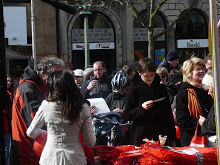

“Auseinandersetzung” Performance action description
The artist enters the performance space. She wears a costume of three levels of plastic tubing, connected with thin clear plastic string. Over the tubing and string, layers of gauze bandages have been sewn loosely. This costume is worn over a thin cotton sleeveless dress or slip. Around the artist’s mouth and lower part of the face, gauze is wrapped. Her arms can barely be seen inside the tube structure, which is knee-length.
The artist turns on music of Fairuz and, before the beamed projection of a Powerpoint presentation of her work and diaries, she begins to move in a very reluctant, but bouncy, manner. At the other end of the performance area sit four large sculptures depicting body parts- some easily deciphered (like a large yellow hand), another more ambiguous (a green nose shape or a truncated penis shape?) all brightly colored in an arrangement on the floor. The artist picks different body parts off the floor, dances with them or inspects them.
While this action is taking place, blood red color gradually appears on the gauze wrapped around the artist’s mouth and color comes out from inside the tube gauze structure around her body. Drops of it fall on the floor and on the sculptures as she begins to dance faster and with less reluctance, even twirling around.
When Fairuz’s song is over (ca. 3 minutes), the artist takes a microphone and sits in the first row with the audience, clears her throat, and starts the sequence of images from the Powerpoint presentation. The space is quiet as she clears her throat and readjusts herself. Images from artworks of the artist are projected on the white wall where she had previously been performing. People, selb-portraits, and images with only text alternate; like an introduction to her work and her experiences. The text is translated from the English into German, describing several experiences she had during her two years living in Shanghai. She reads aloud from the text slides in calm and controlled, yet anxious, voice.
As the last images are projected, the artist stands and walks to the CD player and begins playing Bai Kwong’s haunting remixed ballad __. The last slide is all red and the artist remains standing in front of the red surface, music playing, and her white gauze and cotton ensemble smeared and spotted with purple-ish red drops. She exits.
aus•ei•n•ạn•der•set•zen
I. (mit OBJ)
1. jmd. setzt jmdn. auseinander getrennt von einander setzen Die Lehrerin setzte die Schüler auseinander.
2. jmd. setzt jmdm. etwas Akk. auseinander darlegen, erklären jemandem seine Probleme auseinandersetzen
II. (mit SICH)
1. jmd. setzt sich auseinander sich auf verschiedene Plätze setzen Sie standen auf und setzten sich auseinander.
2. jmd. setzt sich mit etwas Dat. auseinander über etwas (intensiv) nachdenken, sich mit etwas beschäftigen Er hat sich mit dem gesamten Problem auseinandergesetzt.
3. jmd. setzt sich mit jmdm. auseinander sich mit jemandem streiten, diskutieren Wegen dieser Sachen setzt er sich regelmäßig mit seinem Nachbarn auseinander.






